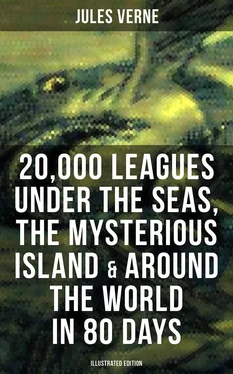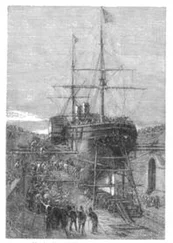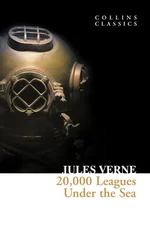Consequently, to calculate the value of this collection was, I should say, impossible. Captain Nemo must have spent millions in acquiring these different specimens, and I was wondering what financial resources he tapped to satisfy his collector’s fancies, when these words interrupted me:
“You’re examining my shells, professor? They’re indeed able to fascinate a naturalist; but for me they have an added charm, since I’ve collected every one of them with my own two hands, and not a sea on the globe has escaped my investigations.”
“I understand, captain, I understand your delight at strolling in the midst of this wealth. You’re a man who gathers his treasure in person. No museum in Europe owns such a collection of exhibits from the ocean. But if I exhaust all my wonderment on them, I’ll have nothing left for the ship that carries them! I have absolutely no wish to probe those secrets of yours! But I confess that my curiosity is aroused to the limit by this Nautilus, the motor power it contains, the equipment enabling it to operate, the ultra powerful force that brings it to life. I see some instruments hanging on the walls of this lounge whose purposes are unknown to me. May I learn—”
“Professor Aronnax,” Captain Nemo answered me, “I’ve said you’d be free aboard my vessel, so no part of the Nautilus is off-limits to you. You may inspect it in detail, and I’ll be delighted to act as your guide.”
“I don’t know how to thank you, sir, but I won’t abuse your good nature. I would only ask you about the uses intended for these instruments of physical measure—”
“Professor, these same instruments are found in my stateroom, where I’ll have the pleasure of explaining their functions to you. But beforehand, come inspect the cabin set aside for you. You need to learn how you’ll be lodged aboard the Nautilus.”
I followed Captain Nemo, who, via one of the doors cut into the lounge’s canted corners, led me back down the ship’s gangways. He took me to the bow, and there I found not just a cabin but an elegant stateroom with a bed, a washstand, and various other furnishings.
I could only thank my host.
“Your stateroom adjoins mine,” he told me, opening a door, “and mine leads into that lounge we’ve just left.”
I entered the captain’s stateroom. It had an austere, almost monastic appearance. An iron bedstead, a worktable, some washstand fixtures. Subdued lighting. No luxuries. Just the bare necessities.
Captain Nemo showed me to a bench.
“Kindly be seated,” he told me.
I sat, and he began speaking as follows:
CHAPTER 12
Everything through Electricity
Table of Contents
“SIR,” CAPTAIN NEMO SAID, showing me the instruments hanging on the walls of his stateroom,
“these are the devices needed to navigate the Nautilus. Here, as in the lounge, I always have them before my eyes, and they indicate my position and exact heading in the midst of the ocean. You’re familiar with some of them, such as the thermometer, which gives the temperature inside the Nautilus; the barometer, which measures the heaviness of the outside air and forecasts changes in the weather; the humidistat, which indicates the degree of dryness in the atmosphere; the storm glass, whose mixture decomposes to foretell the arrival of tempests; the compass, which steers my course; the sextant, which takes the sun’s altitude and tells me my latitude; chronometers, which allow me to calculate my longitude; and finally, spyglasses for both day and night, enabling me to scrutinize every point of the horizon once the Nautilus has risen to the surface of the waves.”
“These are the normal navigational instruments,” I replied, “and I’m familiar with their uses. But no doubt these others answer pressing needs unique to the Nautilus. That dial I see there, with the needle moving across it—isn’t it a pressure gauge?”
“It is indeed a pressure gauge. It’s placed in contact with the water, and it indicates the outside pressure on our hull, which in turn gives me the depth at which my submersible is sitting.”
“And these are some new breed of sounding line?”
“They’re thermometric sounding lines that report water temperatures in the different strata.”
“And these other instruments, whose functions I can’t even guess?”
“Here, professor, I need to give you some background information,” Captain Nemo said. “So kindly hear me out.”
He fell silent for some moments, then he said:
“There’s a powerful, obedient, swift, and effortless force that can be bent to any use and which reigns supreme aboard my vessel. It does everything. It lights me, it warms me, it’s the soul of my mechanical equipment. This force is electricity.”
“Electricity!” I exclaimed in some surprise.
“Yes, sir.”
“But, captain, you have a tremendous speed of movement that doesn’t square with the strength of electricity. Until now, its dynamic potential has remained quite limited, capable of producing only small amounts of power!”
“Professor,” Captain Nemo replied, “my electricity isn’t the run-of-the-mill variety, and with your permission, I’ll leave it at that.”
“I won’t insist, sir, and I’ll rest content with simply being flabbergasted at your results. I would ask one question, however, which you needn’t answer if it’s indiscreet. The electric cells you use to generate this marvelous force must be depleted very quickly. Their zinc component, for example: how do you replace it, since you no longer stay in contact with the shore?”
“That question deserves an answer,” Captain Nemo replied. “First off, I’ll mention that at the bottom of the sea there exist veins of zinc, iron, silver, and gold whose mining would quite certainly be feasible. But I’ve tapped none of these land-based metals, and I wanted to make demands only on the sea itself for the sources of my electricity.”
“The sea itself?”
“Yes, professor, and there was no shortage of such sources. In fact, by establishing a circuit between two wires immersed to different depths, I’d be able to obtain electricity through the diverging temperatures they experience; but I preferred to use a more practical procedure.”
“And that is?”
“You’re familiar with the composition of salt water. In 1,000 grams one finds 96.5% water and about 2.66% sodium chloride; then small quantities of magnesium chloride, potassium chloride, magnesium bromide, sulfate of magnesia, calcium sulfate, and calcium carbonate. Hence you observe that sodium chloride is encountered there in significant proportions. Now then, it’s this sodium that I extract from salt water and with which I compose my electric cells.”
“Sodium?”
“Yes, sir. Mixed with mercury, it forms an amalgam that takes the place of zinc in Bunsen cells. The mercury is never depleted. Only the sodium is consumed, and the sea itself gives me that. Beyond this, I’ll mention that sodium batteries have been found to generate the greater energy, and their electro-motor strength is twice that of zinc batteries.”
“Captain, I fully understand the excellence of sodium under the conditions in which you’re placed. The sea contains it. Fine. But it still has to be produced, in short, extracted. And how do you accomplish this? Obviously your batteries could do the extracting; but if I’m not mistaken, the consumption of sodium needed by your electric equipment would be greater than the quantity you’d extract. It would come about, then, that in the process of producing your sodium, you’d use up more than you’d make!”
“Accordingly, professor, I don’t extract it with batteries; quite simply, I utilize the heat of coal from the earth.”
Читать дальше












